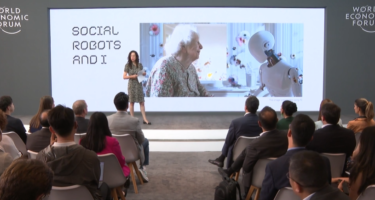Who will rule over this new ‘interconnected global society’ with its ‘countries that exist in cyberspace’? perspective
As the lines between digital and physical spaces blur, the RAND Corporation forecasts that metaverses may come to function like new countries in our society.
With digital identity set to be your passport in the metaverse, and with your metaverse identity projected to be central to your day-to-day life, who will rule these virtual spaces and with what authority?
According to the UK Defence-commissioned RAND report, “Cultural and technological change in the future information environment:
“Regarding the formation of cultural identities at a societal level, the emergence of elaborate virtual environments may change existing cultural identities’ importance while enabling new ones to emerge at the sub-national, national or trans-national level.”
As such, the authors say:
“Expert opinion indicates that future metaverses may reach such a sophistication level that they ‘come to function almost like new countries in our society, countries that exist in cyberspace rather than physical locations but have complex economic and political systems that interact with the physical world’”
What sort of political systems will rule these “countries that exist in cyberspace?” And without traditional borders, what will happen to sovereign nations?
RAND suggests that a “global society” will emerge — one that “may reduce the importance of national and individual identities.”
According to the report, “The emergence of these new virtual environments may correspond with new cultural configurations that complement or diminish existing cultural delineations.”
Therefore:
“Some experts who anticipate a more interconnected global society emerging via virtual reality suggest that such a development may reduce the importance of national and individual identities and change how societies define and shape their cultural identities”
The Information and Communication Technologies (ICTs) underpinning metaverses will include “advanced wireless networks (e.g. future iterations of 5G and 6G), cloud computing, antennae technologies, IoT expansion, next-generation semiconductors and blockchain application for information processing systems.”
This underlying technological architecture is expected to lead to “real-time holography (i.e. digital representations of humans or physical objects in a virtual environment) and neural rendering (i.e. realistic digital rendering of humans in place of computer-generated avatars), interactive AR applications (e.g. AR embedded into wearable devices such as contact lenses, mirrors and windshields), and fully-immersive environments facilitating real-time virtual interaction.”
It is against this backdrop of interconnecting technologies powering the future global society that RAND sees the potential for a “human application programming interface (API), which AMWakeUp host Steve Poikonen recently dubbed, “the compliance switch.”
Here’s what the RAND authors say, and see if you agree with Poikonen’s interpretation:
“Among more disruptive concepts, experts suggest the potential for developing a human application programming interface (API), i.e. a programme to ‘store and enforce the rules people set about what is allowed to come into their awareness, what takes up their time and what information is shared about their activities'”
Storing and enforcing rules about what is allowed to come into our awareness, what takes up our time and how information is shared about what we do? Sign me up!
The people at RAND, or perhaps their contractor at UK Defence, seem particularly worried about who will have access to certain information and what they will do with that knowledge in the future.
The report is replete with warnings about the dangers of so-called misinformation and how metaverses may lead to social manipulation.
For example, they say that “virtual environments may amplify current challenges via echo chambers, filter bubbles, and algorithm-driven polarization,” and that:
“A metaverse enabling greater personalization of user experiences may yield more fractured views of reality, potentially exacerbating existing echo chamber/filter-bubble effects by amplifying the cognitive biases […] This dynamic might involve communities and societies experiencing parallel realities, exacerbating societal polarization and distrust in established information sources.”
We can’t have people showing “distrust in established information sources” now, can we?
Additionally:
“The emergence of more potent forms of social manipulation and threats such as mis- and disinformation is a significant concern about virtual environments, reflecting the suggestion that immersive virtual environments are more influential than less immersive communication forms (e.g. current social media)”
“Virtual reality can also be continuously and dynamically manipulated, potentially amplifying manipulation risks, increasing distrust and blurring the lines between virtual and physical realities and truth and fiction in either environment”
Another perceived threat is that authoritarian regimes will exploit metaverses.
Perhaps, this is why the authors envision an interconnected global society in metaverses that function like new countries — there can only be room for one authoritarian regime, not many!
According to the report:
“Some experts warn of significant threats to human agency via the increased risk of malign actors, such as authoritarian regimes, exploiting virtual environments for surveillance and societal manipulation”
Whether it’s the founding of a settlement in a new city, state, country, virtual territory, or even planet (hello Musk and Mars!), there will always emerge some element of an authoritarian presence because that’s what we humans have always done and will continue to do.
There can be no light without darkness; no good without evil. When one force becomes too powerful, the other is there to bring back balance.
The same will be true for future metaverses.
While many praise these future virtual spaces for bringing about greater connectivity and convenience, others warn of total subjugation and control.
According to RAND, “In scenarios where virtual environments lack privacy safeguards, selected private sector or governmental actors could use direct control to limit an individual’s agency in digital interactions.
“The changing relationships between individual end users and those controlling virtual environments have led some to argue that ‘our sense of physical identity, time and agency will become subject to entirely new paradigms where the gateways to these experiences might be controlled by interests other than citizens.'”
You don’t say?
And if users are manipulated in virtual spaces, they make act out in physical ones.
According to the report:
“Manipulating virtual realities may negatively affect individual psychology in the virtual and physical space. Therefore, manipulations experienced in a digital environment may influence an individual’s physical or ‘real-world’ behaviors, potentially challenging established sociocultural institutions such as democratic political systems.”
Heaven forbid people start challenging their institutions and political systems!
Last week, The Sociable reported on the same 101-page RAND report, which also forecasted that the Internet of Bodies may lead to an Internet of Brains by 2050.












